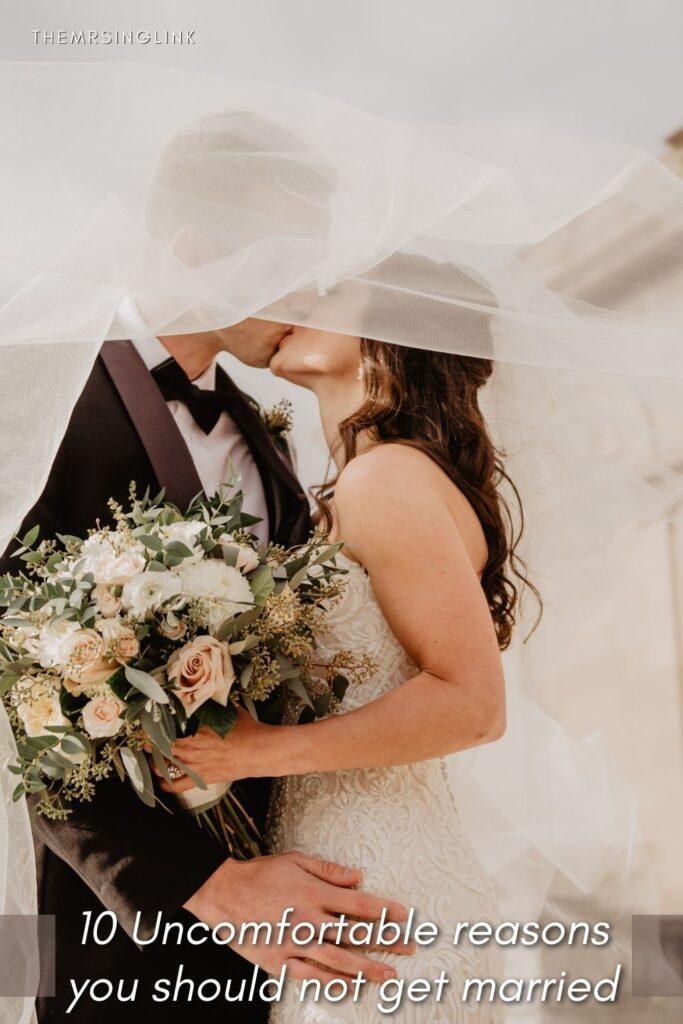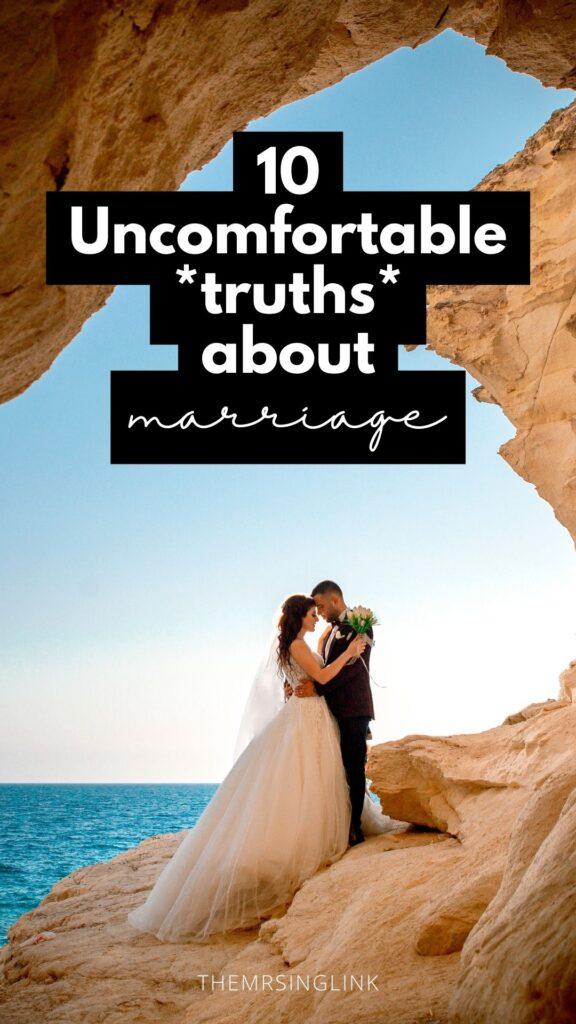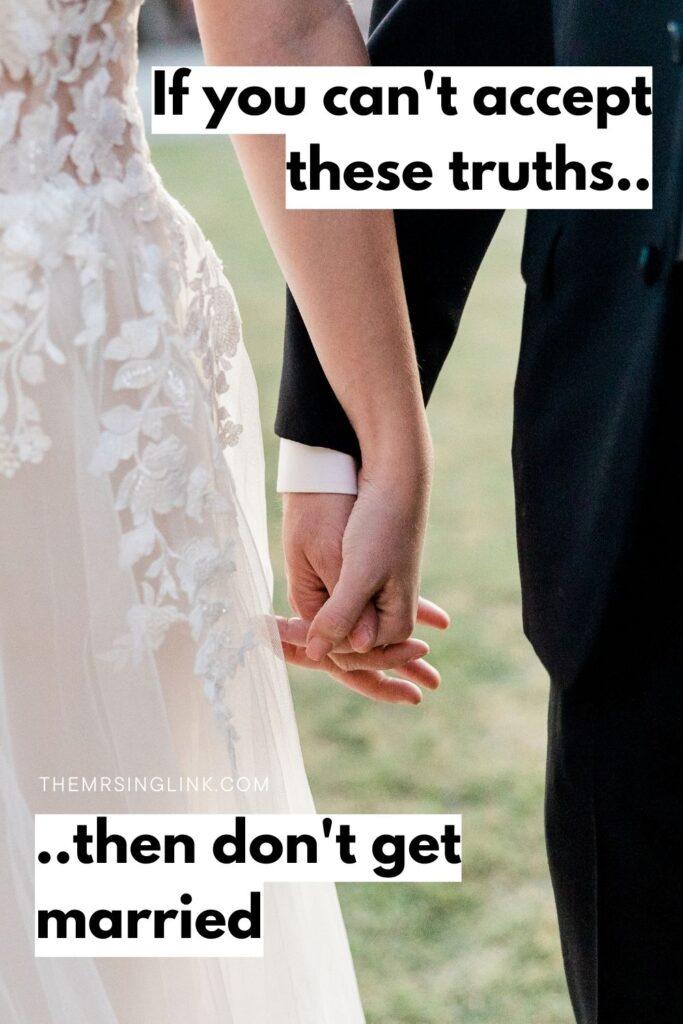Before deep-diving into this post, I first came up with a brief, rough-draft list. This list mounted well into the 20-something, yet I narrowed it down to the top 10 uncomfortable reasons you should not get married. Eeek.
BUT, this post really isn’t all you think it will be. When I say uncomfortable reasons, what I really mean is brutally honest “truths” that are triggering for many. And when I say you should not get married, what I really mean is…in order to know and understand the true value of marriage you must be able and willing to face and embrace these uncomfortable truths.
Therefore, this is a forewarning that this post may be pretty bleak, some of the things I say might make you feel bitter or vexatious (irritated), like nails on a chalkboard. But that’s kind of the point since marriage is a big deal – it will expose you and bring about discomfort. This is what humbles you because marriage isn’t all rainbows and unicorns. Marriage is not designed around your comfort. So if it’s words that are as soft and sweet as marshmallows you’re looking for, then this isn’t it, because I won’t be sugar-coating the truth that people (mostly in the back) need to hear.
10 Uncomfortable reasons you should not get married
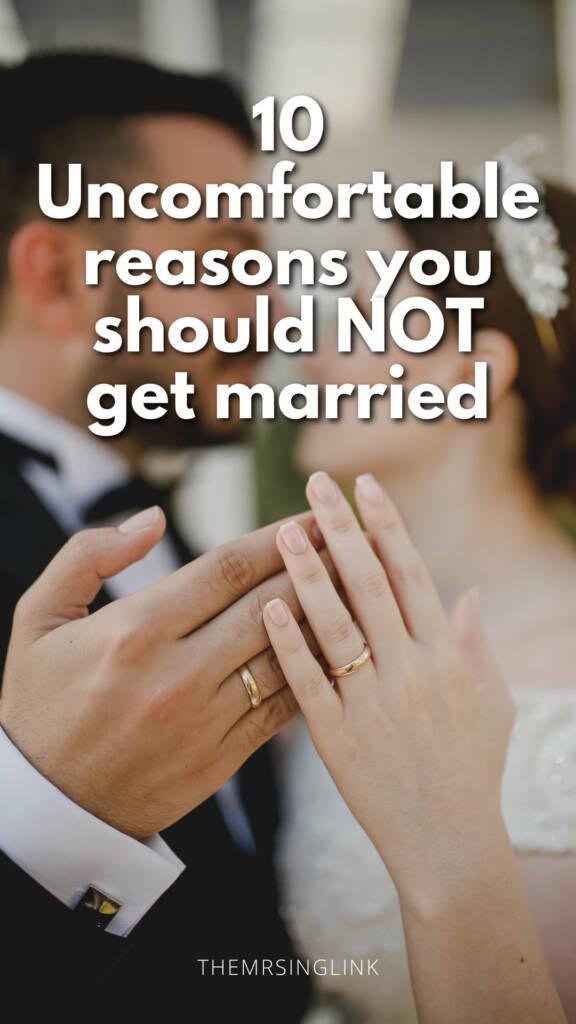
Do not get married if…
you think you never [have to] evolve or change
Or adapt. Or compromise. Or make “sacrifices”. Ooof, I can feel some of the eye-rolls. Or to do what is right, not what’s easy. Or make choices that benefit you the least, but uphold relationship integrity. Or to open your mind and heart, rather than leaning on your own understanding. Because the truth is, marriage will [should] do this to you.
So here comes the kicker: don’t get married if the thought of change, or making a change for the [better] quality of your relationship makes you want to [quite literally] punch a baby in the face, or bury yourself alive.
Society speaks of sacrificing for “the greater good”. The same applies to marriage. Though, of course not without resistance, because that kind of tolerance only seems acceptable in certain narratives, and committed relationships do not fit the bill these days.
If you’re someone fixed in your belief that you won’t or shouldn’t [have to] change for marriage, your partner, or anyone, then make sure you’re ready to defend that change and sacrifice [in the world] is therefore not expected, necessary, or significant at all.
Listen, I said I wouldn’t hold back.
you can’t accept your partner (for who they are); you expect unconditional compliance
The person they were yesterday, who they are today, and who they will be tomorrow. You shouldn’t get married if you think you can change your partner, or that you are entitled to change them (in a way that suits you). Or fix, save, convert, manipulate, provoke, and the like. We all want, crave, and desire unconditional Love, but we’ll never fully achieve that when we’re basing marriage on our every condition being met. And if our every need and condition is met, we’ll never really know what it truly means to be accepting, or to accept your partner for who they are. Unconditional Love runs parallel with understanding acceptance – that our partner will NOT fulfill our every need or condition.
This goes without saying you cannot expect your partner to tolerate everything about who you are. Read that one slowly.
It’s important not to take this fairly popular quote out of context, “If you can’t handle me at my worst, then you don’t deserve me at my best.” Be careful – is all I’m saying – when unpacking the context of your worst. This quote, while normalizing [the acceptance of] our human imperfection, also conveys the message that being your best justifies [condones, enables] being your worst.
In a sense, this quote walks a fine line of weaponization. The right partner will extend grace, mercy and forgiveness in time of your worst (which we ALL experience), but your partner is not expected to tolerate your worst in order to receive your best. For example – your inability to control your temper (yelling, screaming, punching walls, verbal abuse, kicking doors, making [physical] threats, etc.). *This is just one measly example.
So if you’re going to use that as a weapon of compliance (to Loving you unconditionally) against your partner, that they should tolerate you at your worst because that’s part of “who you are”, don’t get married.
The idea of “One Flesh” is non-negotiable, intolerable, and unacceptable
People have really equated the whole “one flesh” to relationship toxicity. Mainly because people aren’t actually representing the meaning and intent of “one flesh”, but also that – IMO – people are simply committed to doing the complete opposite. Even if that’s at the expense of a [healthy], long-lasting relationship.
Guess what? Marriage is about the conjoining and commitment between two people on a level beyond just a “relationship”. That’s why marriage is made separate; there are things you are not expected of or committed to in a relationship as you are in marriage. If you aren’t sure what that means, here’s a simplified explanation to better understand: your spouse becomes a part of you, as you become a part of your spouse; figuratively, spiritually, physically, emotionally, and energetically.
Therefore, it’s as the saying goes: you can’t hurt your spouse without hurting yourself, and vice versa. So you are to love, honor, value, and respect your spouse as you do yourself. In marriage, you are two [whole] individuals and equals within a shared circle. Not above or beneath one another, but sharing, operating, and maintaining the same boat. So when one side gets a leak, it doesn’t matter whose side it is, the entire boat is sinking.
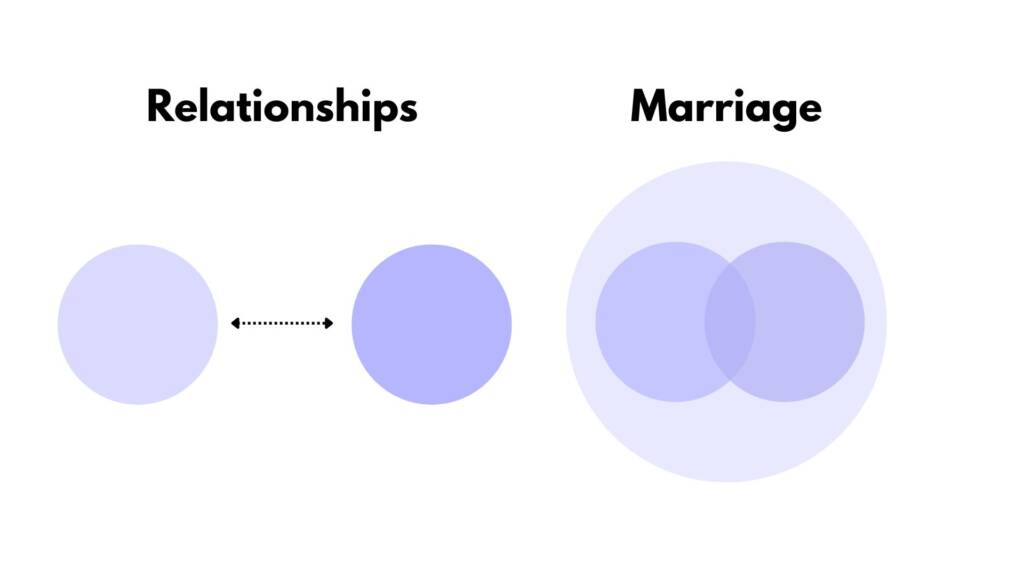
Yet many seem to get super butt-hurt over “worldly” conjoining factors, such as finances, individuality (“identity”, autonomy), personal desires, freedoms, aspirations, and life choices in general. AKA, many are triggered by the fact they now [should] have to consider, weigh in, and equally value a whole other person. So they blanket-ly label this toxic or oppressive simply because it conflicts with their “individual freedoms”. Hence why marriage is often attributed as being a relinquishment of that “freedom”. Personally, I think it’s more of a heart issue than a “freedom” issue, and there are those committed to misunderstanding this.
I see it like this: conjoining your life with someone becomes non-negotiable, intolerable, and unacceptable when you yourself are non-negotiable, intolerable, and unaccepting.
So for the sake of respecting the soul-binding commitment marriage represents, please don’t get married if you aren’t capable of surrendering (your pride; “denying thy self daily”), compromising (which involves making sacrifices; having integrity for the “entity” of marriage) as well as valuing your partner’s best interest and well-being (as you would your own; having your partner’s best interest won’t always be in *your* best interest).
You believe you lose more than you gain
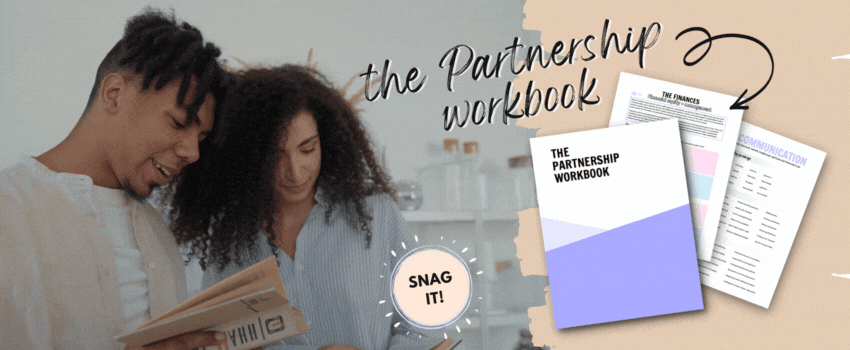
Again with the whole losing of oneself or “freedoms” by way of marriage – aka, having to factor another person in your life. If you automatically view sharing [committing] your life with [to] someone as self-sacrificing, tyrannical, or oppressing, then you’re also denying, denouncing and depreciating what is gained. Much of this I believe are those who simply want to avoid responsibility/accountability (and repercussions). They aren’t equipped to face let alone *want* to have to control their convictions (feelings or remorse for wrongdoing) and “temptation(s)” (things that test their desires and integrity); for example, how to handle a situation when someone else exudes flirtatious behavior toward them.
Yet, oftentimes people say marriage in and of itself is just another added responsibility, like a burden. The unavoidable fact is…it is a responsibility, and that’s the point, for good reason.
Nobody has children for the sole enjoyment of playing with them – no, you have children knowing there’s the added responsibility, like meeting their basic needs but also providing them with the love and wisdom for a favorable outcome in life.
Nobody buys a car for the sole enjoyment of riding in it – no, you buy a car knowing there’s the added responsibility, like changing the oil, rotating the tires, and utilizing it safely to get to point A to point B.
Marriage isn’t solely about the benefits of companionship – no, you get married knowing there’s the added responsibility when you’re doing life ALONGSIDE another person; your words, actions, and choices have consequences that may jeopardize or impact the relationship and your *life* partner.
Marriage requires you to actually be [more] self-accountable. It forces you to *check yourself* while having someone else hold you accountable when you fail to do so. Your partner is also someone who is capable of extending grace, compassion, and forgiveness, too. That’s called Partnership. Your job [career] isn’t all fun and games when there’s responsibility and accountability in that, too. That’s without even touching on the fact that people want to be [treated, valued as being] indispensable.
Hm, interesting, because marriage represents just that.
Granted, you need your job to “survive” by making a living, but you willingly sacrifice a lot for not only that steady paycheck but the prestige (success), title, reputation, and positive reinforcement (from your boss). Marriage deserves the same recognition for what is gained (companionship, partnership, friendship, fellowship), and if you don’t see the value in that then I would stick firmly to a transactional business relationship over marriage.
You’re doing it to have the “Wedding”
As much as anyone would never dare to admit this, so many view and treat the Wedding (this includes the wedding day and honeymoon if they have one) as the foretelling for what marriage will be like. If it’s not the idea that marriage will mirror the all-good *feels* and fairytale vibes of the wedding day, then its succumbing to that “ball and chain” mentality that marriage only goes downhill from there (the wedding/honeymoon). Nonetheless, there’s this unconscious audacity to expect that marriage will remain a constant (all *sparks*, butterfly feels, hot passion, fun vibes, smooth sails and no humps or mountains to climb). And if it doesn’t…well.
Marriage is a big deal. And when marriage is a big deal so will be the Wedding –yes – because the Wedding signifies “The first day of the rest of your lives T o g e t h e r.” The wedding day separates your life before (as a single individual) from now on (mutually giving/committing yourselves to one another through the deepest form of commitment). You’re choosing to do *life* with that person, not just with/for yourself!
FYI, when you “give yourselves”, aka submit to each other…that means the focus becomes less about “I, me” (receiving) and more about “You, us” (serving). Therefore, if your idea of marriage is limited to what [little] you’re willing to give over what you expect to receive, then you might consider that you only anticipate the superficiality of “getting married” (on the surface) rather than the reality of marriage (below and into the depths).
You haven’t discussed or won’t loosen your grip on the “The Big Things”
What “Big Things”? For starters, these are the things [about your partner/involving your relationship] you should have a mutual understanding of or at least have a solid idea about prior to marriage. Critical things, like whether or not you want to have children, each of your core child-rearing principles, your roles as partners (responsibilities, expectations, contributions, similarities, differences, *strengths, and *weaknesses), differing religious views/values, how you will handle the finances [together], and any specific expectations or non-negotiables (for instance, you will not work and raise a child). *These are just to name a few. If you haven’t talked about these things, then you’re marrying someone under false pretenses. Where’s the fairness in that?
And if your expectations and ideals (aspirations, standards, goals, principles, values, preferences, etc.) are rigged (strict; restricting, unrelenting) or loose (pliable; easily persuaded, reduced ), you ought to consider how this has played out in your relationship(s) in life thus far.
Yes, there are surely things worth holding firm to in order to align with a life-long partner, but you need to remember that life (and relationships) can also have a way of changing [reshaping, reforming, rebirthing] our minds and hearts, or at least welcoming and holding that space. Again, because marriage now involves another person – a person you should also want to consider (and value) when it comes to “The Big Things”.
You intend to hide, deny or justify your inner darkness
We definitely live in a time of this “new age” movement that promotes healing whilst glamorizing imperfection. It’s almost like we can’t bear to admit or acknowledge our human “brokenness” (the dark inner parts of ourselves) for what it is without a “comfy” disclaimer, so we say things like we’re perfectly imperfect.
I digress. Discussing the “Big, Important Things” also means opening up [unveiling the truth] about the things (the undesirable, scary, shameful, insecure, “dark” parts of ourselves) that also play a major role in marriage. Most of the time this simply means facing these parts of ourselves ourselves, rather than burying them deeper or projecting them onto others [our partner].
Like previous trauma – maybe you have deep-rooted distrust [in men] because not only did your father cheat on your mother but he was also absent in his role as a parent in your childhood; this has made you hyper-independent (the “do it all myself” type, won’t ask for help or are resistant to help that is offered), you base your worth on individual performance/status/success (you do the same when seeking a potential partner), you’re standoffish/emotionally closed off (your instinct is to be wary of others who try to get too close or try to break your “barrier”), and/or you’re overly-controlling and critical (of yourself and others) into your adulthood. This had a hardening effect on your heart, hence for both the exterior and interior “toughness”, which usually ends up pushing people and repelling away relationships. Thus reinforces your conditioned belief that people [men] are unreliable and untrustworthy.
Childhood and generational conditioning – say you grew up in an emotionally unstable household with no boundaries, where you often felt responsible for your parent’s [extreme] emotions and happiness; therefore you often try to control the way other people feel in order to maintain a false sense of Peace and harmony, which leads you susceptible to violating others’ boundaries, as well as neglecting and having none yourself, and codependent relationships of self-neglect and manipulation (where your happiness and sense of self is based on and found in a partner).
Social and environmental impact – you always felt like you were different (or abnormal) from others, were made known and labeled as the “weird” kid in school (maybe even bullied or segregated), which made it difficult to make and hold onto genuine, lasting friendships; it was a common occurrence for people to come and go in your life through adolescence and into your adulthood, and because of this you remain closed off emotionally in order to protect yourself from abandonment and disappointment. Therefore, you struggle to connect with others on a deeper level.
If you live out your life, and relationships, dead set on avoiding facing these things (for whatever logical or justified reason), you are only setting a very limited threshold and unrealistic capacity for how relationships work (and thrive). Ultimately, this prevents optimal satisfaction and growth. And if you aren’t willing or prepared to free yourself from the bounds you choose to remain chained to, then you definitely shouldn’t confine your partner to those bounds in marriage.
you aren’t ready to face and work on those parts of yourself
Nobody’s asking you to be the image of human perfection, but your inability to be perfect doesn’t negate having to acknowledge, address and work on the parts of yourself that – inevitably – hurt you, and others.
There comes a point where the “it’s who I am” mantra loses its traction when the end result is more often chaos and destruction. People instead have glamorized their trauma and unhealthy flaws, which is not the same as understanding and accepting them.
So whether that’s your short fuse, compulsive falsification or deception, combativeness or aggression, ungrounded lack of self-control, inability to resist temptation and destructive behaviors, overt possessiveness and jealousy, or deep-rooted insecurities and lack of trust. In marriage, yes, it is about accepting someone for their strengths AND their flaws, but marriage should never be treated as “take it or leave it” in terms of the parts of ourselves we want to hide or ignore.
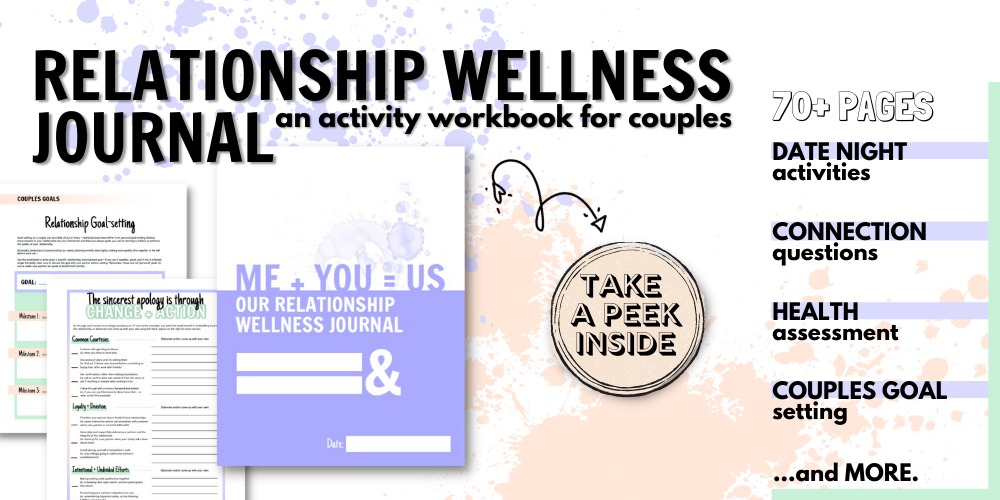
You believe it’s just a piece of paper
So is money, yet most are willing to surrender themselves for it every single day til the day they die. You know what else is just a piece of paper? A title, a deed, a birth certificate, a diploma. So, then, why do you need all those things as proof that you…own the house, or a business, are of existence and have human rights, or are educationally experienced for the job?
The whole “marriage is just a contract […insert something about how men generally get screwed over financially or how it’s used to control or claim ownership over women…]” is pretty easy to argue for me.
What I’m about to say isn’t going to be an easy read. Marriage is no longer a relationship – marriage is marriage. Marriage was designed by God, yet man decided to twist its meaning and depreciate its value for inclusivity – establishing a version of marriage that suited everyone. A legal commitment without the covenant; even by taking God out of the picture altogether. So instead of God [the church] ordaining the marriage (by way of ensuring the marriage complied with religious values), the government does (for legal and evidentiary documentation purposes). Fun fact: the government would prefer no one to be married because that means they can collect more in taxes (meaning more money in their pocket). Hm, and that seems to be turning in their favor these days.
To correct the finality of marriage by parchment nonsense: yes, without God, marriage is nothing but a piece of paper. Today, I feel, marriage is less “I do/will BECAUSE..” and more “I do/will, IF YOU..”, which is a contractual agreement. Marriage then goes from being about serving and submission to self-benefitting and defiance. *Context, people, context.
Now, I am prompted to ask the question I think most – who do not value marriage as a covenant – already know the answer to: What is marriage? From a worldly standpoint, it does sound a lot like an institution. I won’t describe it further. That said, if you aren’t getting married under God (a spiritual covenant), then you are solely getting married for that contractual piece of paper. Monetary reasons, per say, hence the rise in prenups.
Do I think marriage is right for every single person? Absolutely not, and many are embracing that. Do I also think every single person is capable of, suitable for, and equipped to handle any job – lawyer, doctor, construction worker, farmer, scientist, astronaut, surgeon, boat captain, or pilot? Nnnnnope. Alas, nobody seems to attack the business model, necessary skills, and [experience] requirements of those difficult jobs, yet it’s easy to pick apart, point out, twist and blame everything that’s wrong with what marriage entails/requires. So if you can’t get passed the idea of marriage beyond a piece of paper, or contract, you’re committed to missing the point altogether.
The “D” word is a back burner option
[mailerlite_form form_id=23]Listen – before I go on, I am not condoning abuse of any kind, or staying in a [unhealthy] relationship/marriage – period. I [We] don’t need to explain that anymore.
This one, I know, will leave a lasting sour taste in many mouths. But it is a fact – divorce is more normalized, even if that’s quietly. In fact, divorce is now celebrated. Divorcees are throwing parties and spending gobs of money to exemplify their newfound “freedom”. As someone who doesn’t believe in the “D” word as an option, that’s not to say divorce isn’t the right/best decision for people. But I’m also not a believer or supporter in celebrating divorce, either. Since 44.2% of marriages as of today end in divorce, that’s nothing to celebrate.
Therefore divorce is getting more comfortable in its [false positive] spot in the limelight, while the value of marriage (and its seriousness) is depreciating. How do? More people are *rushing* to get married (early or later in life, and not under the healthiest circumstances), entering marriage for the wrong reasons, and are not taking it as seriously (on marriage #2,3,4, and so on). I’m not here to judge, just pointing out the truth.
Even though people are – obviously – getting divorced no problem, there’s still this sense of knife-cutting tension about divorce having a seat at the marriage table. The saying, “Take divorce off the marriage table” simply means to avoid weaponizing marriage with divorce. People have it as their concealed carry while denying their intent to use it. When do we admit this is often being reflected in our attitude, energy and effort toward marriage (and our partner) and as a result creates a magnitude of weight and puts an often invisible strain on a marriage?
For me, [the idea of] divorce has become this driving force or wedge in our ability to form and maintain the level of love, connection, and commitment marriage is to embody. It’s like we can’t imagine let alone fully trust in a marriage without divorce in the same room or within reach – we GOTTA know it’s there, and make its potential use well known. And we do this in ways without even mentioning the word at all – it’s in our behavior now!
So it isn’t crazy to say that effort, patience, grace, forgiveness, and acceptance are limited, withheld or restrained now more than ever when marriage is faced with hardship, or in making a marriage work. So, in my humble opinion, if you treat marriage with “divorce as an option” instead of “divorce is not an option until it becomes the only option”…then you shouldn’t get married.
